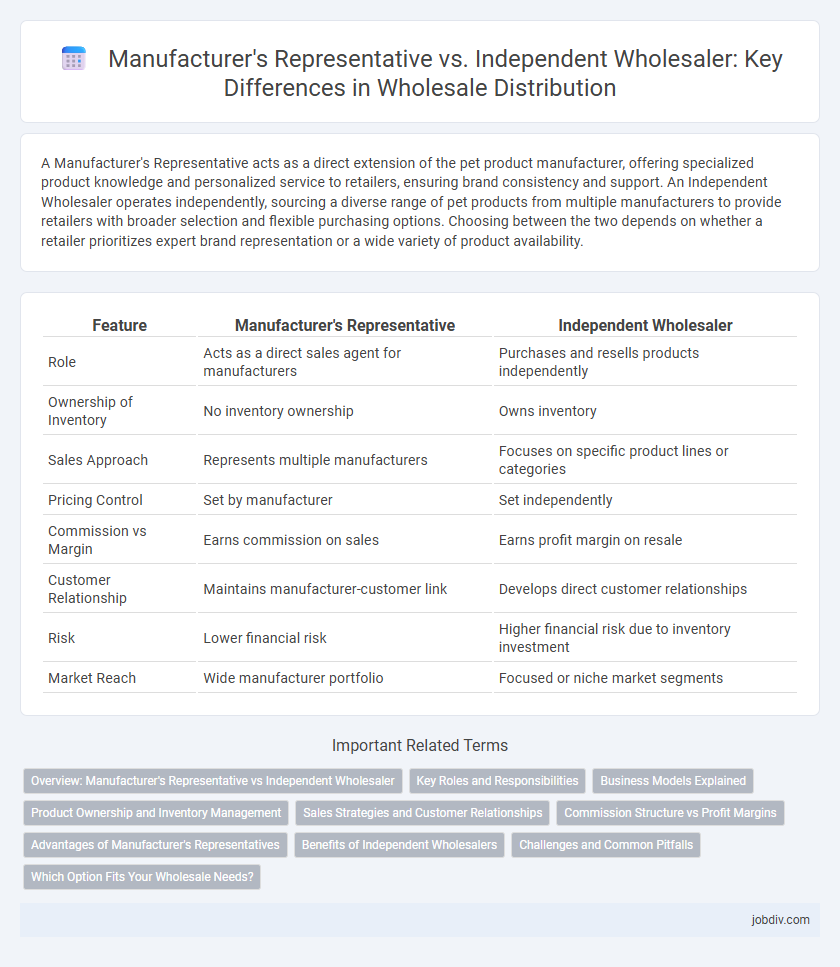A Manufacturer's Representative acts as a direct extension of the pet product manufacturer, offering specialized product knowledge and personalized service to retailers, ensuring brand consistency and support. An Independent Wholesaler operates independently, sourcing a diverse range of pet products from multiple manufacturers to provide retailers with broader selection and flexible purchasing options. Choosing between the two depends on whether a retailer prioritizes expert brand representation or a wide variety of product availability.
Table of Comparison
| Feature | Manufacturer's Representative | Independent Wholesaler |
|---|---|---|
| Role | Acts as a direct sales agent for manufacturers | Purchases and resells products independently |
| Ownership of Inventory | No inventory ownership | Owns inventory |
| Sales Approach | Represents multiple manufacturers | Focuses on specific product lines or categories |
| Pricing Control | Set by manufacturer | Set independently |
| Commission vs Margin | Earns commission on sales | Earns profit margin on resale |
| Customer Relationship | Maintains manufacturer-customer link | Develops direct customer relationships |
| Risk | Lower financial risk | Higher financial risk due to inventory investment |
| Market Reach | Wide manufacturer portfolio | Focused or niche market segments |
Overview: Manufacturer's Representative vs Independent Wholesaler
Manufacturer's representatives act as outsourced sales agents, promoting products for multiple manufacturers without holding inventory, allowing manufacturers to expand market reach efficiently. Independent wholesalers purchase bulk goods directly from manufacturers, maintain inventory, and resell to retailers or businesses, managing logistics and distribution. The key difference lies in ownership and control of inventory, with manufacturers' representatives focusing on relationship management while independent wholesalers handle stock and delivery.
Key Roles and Responsibilities
Manufacturer's representatives act as direct agents for producers, responsible for promoting products, securing orders, and maintaining client relationships within specific territories. Independent wholesalers purchase products in bulk from manufacturers, manage inventory, and handle distribution logistics to retailers and smaller buyers. While manufacturer's reps concentrate on sales and brand representation without holding inventory, independent wholesalers focus on supply chain management and product resale.
Business Models Explained
Manufacturer's representatives act as external sales agents for multiple manufacturers, leveraging established relationships to promote products without holding inventory, which reduces overhead costs. Independent wholesalers purchase products in bulk from manufacturers, store inventory, and sell directly to retailers or businesses, assuming greater financial risk but also benefiting from higher control over pricing and supply. Choosing between these business models depends on a company's need for market reach flexibility versus inventory management and capital investment.
Product Ownership and Inventory Management
Manufacturer's representatives do not take ownership of products or maintain inventory, acting solely as intermediaries to promote and sell the manufacturer's goods. Independent wholesalers purchase and own inventory, managing stock levels and bearing the financial risk associated with product storage. This distinction significantly impacts cash flow, control over pricing, and customer relationships in wholesale distribution.
Sales Strategies and Customer Relationships
Manufacturer's representatives leverage direct manufacturer connections to implement tailored sales strategies that enhance product placement and brand consistency, fostering strong, trust-based customer relationships through personalized service. Independent wholesalers utilize broad product portfolios and flexible distribution models to negotiate pricing and delivery, emphasizing volume discounts and responsiveness to customer needs to maintain loyalty. Both roles prioritize understanding market demand, but manufacturer's representatives focus on brand-specific growth while independent wholesalers optimize inventory variety and customer access.
Commission Structure vs Profit Margins
Manufacturer's representatives typically earn commissions ranging from 5% to 15% on sales generated, enabling manufacturers to minimize overhead costs while expanding market reach. Independent wholesalers purchase products outright, aiming for profit margins often between 20% and 40%, which involves higher capital investment and inventory risk but greater control over pricing. The commission-based structure of manufacturer's representatives reduces fixed expenses for manufacturers, whereas independent wholesalers rely on margin optimization to sustain profitability.
Advantages of Manufacturer's Representatives
Manufacturer's representatives offer personalized sales expertise and direct manufacturer knowledge, enabling tailored customer solutions and stronger brand advocacy. They operate on commission without inventory risk, reducing overhead costs for manufacturers while expanding market reach efficiently. Their established networks and industry insights enhance market penetration faster compared to independent wholesalers.
Benefits of Independent Wholesalers
Independent wholesalers offer manufacturers greater flexibility by representing multiple product lines without exclusivity constraints, allowing for broader market reach. They reduce operational costs by handling inventory, distribution, and sales logistics, enabling manufacturers to focus on production. Their established relationships with retailers often lead to faster market penetration and increased sales volume.
Challenges and Common Pitfalls
Manufacturer's representatives often face challenges related to limited control over product pricing and inventory, which can hinder their ability to meet sales targets effectively. Independent wholesalers encounter common pitfalls such as high competition and the need to maintain extensive supplier relationships while managing cash flow constraints. Both roles require strong negotiation skills and market knowledge to overcome obstacles and sustain profitability in the wholesale industry.
Which Option Fits Your Wholesale Needs?
A Manufacturer's Representative acts as a direct extension of the producer, specializing in promoting specific product lines to retail and distribution channels, often with deep industry expertise and established buyer relationships. Independent Wholesalers purchase products in bulk from various manufacturers and sell them to retailers, offering flexibility in product variety but less control over exclusive brand representation. Evaluating your wholesale needs depends on whether priority lies in specialized brand advocacy and market penetration or in broader product assortment and inventory control.
Manufacturer's Representative vs Independent Wholesaler Infographic

 jobdiv.com
jobdiv.com